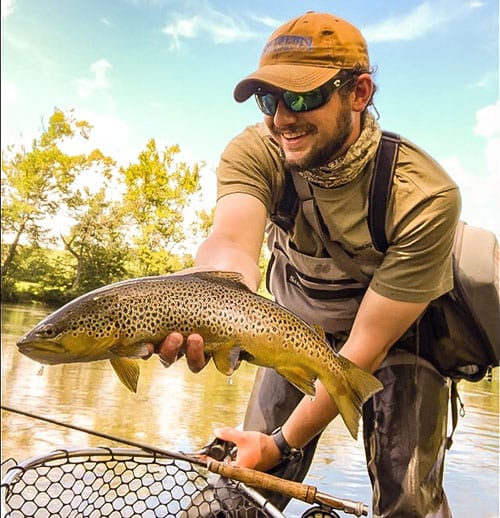Wintertime in the Southern Appalachians is one of my favorite seasons to fish. While crowds are few and far between, the fish are still as present as ever and can reward the willing fly angler with a chance at some of their biggest trout of the year- if they are ready to combat the bitterly cold winter temperatures that are sometimes sustained here in the mountains. This article won’t focus so much on the fishing aspect (fishing tactics trout-wise are somewhat similar year round, only slower in catch rate) but rather the gear that is needed to keep you not only warm but avoiding a potentially dangerous fall into the water that could lead to hypothermia. I won’t focus so much on layering or how to stay warm (I wrote a previous article on that a year ago you can find online) but rather essential items of gear I won’t fish without in the winter.
Any guide I know would not be caught without a wading jacket while out on the water during the winter. A quality wading jacket worn over your waders will serve a twofold purpose: one being as a waterproof outer layer and the other as an extra assurance in the event you fall into the water. Wearing a wading jacket can help keep your body completely waterproof and dry. There are several options on the market now, but my favorite all around wading jacket would have to be my Simms Challenger for the price point, waterproof quality, and overall warmth (providing proper layering underneath).
I do think fishing gloves are a viable option for sustained outings to protect from frostbite. However, I will warn that in my experience, inevitably, your gloves can and will get wet, usually when trying to release a fish. Believe it or not, one of the most important items that I carry with me in my wader pocket is a microfiber cloth to dry my hands with. Cold, wet hands are miserable to fish with and can also lead to an increased chance of hypothermia. Having something to dry your hands off with will ultimately keep your hands more functional and keep you on the water longer in cold conditions.
If you have ever skied or snowboarded, then you’ll understand the effects that the sun’s rays can have on your eyes when being reflected off of the snow. Even on cloudy days the glare can inhibit your ability to not only fish but also wade, leading to the likelihood of falling into deeper water, or tripping over a rock, ever more likely. A good pair of polarized sunglasses can help prevent snow-blindness as well as keep the odds of you falling in at a minimum.
Lastly, in the event that a fall does occur: I always keep a spare change of clothes and a towel in a dry bag with me to change into. I can’t stress the importance of staying as dry as possible while on the water, and riding home with wet cold clothes on is a miserable experience (take that from me personally).
While these tips might seem mundane to the experienced angler, I would urge anyone who is interested in winter fishing to invest in and use the items mentioned religiously, while on the water. The name of the game with winter fly fishing is endurance, and your choices in gear can either make or break your ability to stay comfortable enough to fish for long periods of time in the cold.
Ethan Hollifield is an Environmental/Physical Science Teacher and is also a guide for Southern Appalachian Anglers.
